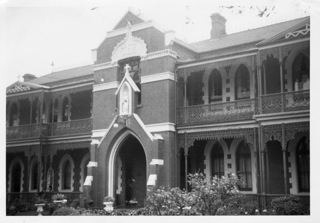In my sixteenth year of life, for reasons too long and
detailed to list here, I spent the best part of that year in boarding school.
During that time I lost track of my body. The only time I saw it was
at night in the dim light of the Immaculate Conception dormitory when I slipped
out of my blouse and tunic into my pyjamas. It was too cold to linger long. We did not have mirrors except in the downstairs bathroom
and once or twice a week I might catch sight of my face when I washed my hair
in the sink, but otherwise I forgot the rest of my body from the neck down.
It was easy to hide within the uniform over which I wore a
baggy gingham pinafore. In such capacious clothes it was easy to grow, and grow I did
into a much bigger person than I had been when I first started at boarding
school.
Before then my brothers
had called me skinny Lissie, but in my adolescence, reinforced by my year at
boarding school, all this changed.
During one of the holiday breaks my older sister took me to
shop for new clothes.
‘You’re bigger than me,’ she said when I tried on trousers
behind a curtained cubicle in Myers.
‘You’ll have to watch out.’
Back at school I could not watch out. The lure of the comfort food, hot
buttered bread rolls for breakfast drizzled with honey, and buns at after noon
tea united with vast mugs of hot chocolate.
A tiny photo of the boarders. I'm the long haired one, standing at the extreme right in the middle row. Our bodies are all well hidden behind our dressing gowns.
When I left school I took to trying to shift my boarding
school bulk with diets and exercise. I devised my own exercise regime and tried hard to stick to
it but it seemed a cruel way to start each day and worse still if I left it till
the end of the day. The thought of the exercise ahead of me took away any
pleasure a day might once have held.
In time I gave up all stereotyped exercise preferring to use
my body for purposeful actions, the sort that make up a life, walking,
housework, sex.
I have since enjoyed a life that is exercise free until
recently when a friend sent me notice of a new form of exercise called Keiser
training. Two half hour sessions a week are all a person needs to begin to
develop stronger muscles.
‘If you don’t get some exercise,’ my daughters warn me,
‘your bones will start to crumble.’
And so for the past two weeks I have visited a
physiotherapist at the
Keiser training centre closest to my home and begun to
acquaint myself with a series of machines designed to give me back my strength.
The Keiser training place looks like a space laboratory,
white walls, clean wooden floors and a series of machines each erected
differently to take a person through a series of manoeuvres designed to offer
resistance in the form of increasing weights pitched against particular muscles
and movement.
My neck is weak, the physiotherapist tells me, perhaps from
sitting for hours hunched over a desk; but over all my agility is fine. So far the exercise seems painless but
she reminds me, we are still on relatively light weights.
I do this exercise now because it is allegedly good for me. I do it to get my daughters off my
back. I do it because I am
fearful that my bones might crumble if I do not offer some resistance to the
process of aging, but it will take some perseverance and my track record is not
good.
I wonder whether I am alone in this. All my life I’ve been dogged by a sense
of never being able to catch up with myself.
It once took the form of a thought, a thought I had when I
was in grade six: if only I was now back in grade two I would be able to do
grade two again and so much better.
When I was in my final year at school the same thought: if
only I were just now beginning high school, with all the knowledge I have gained since, I’d be able to do it so much better.
And now more than half way through my life the same thought
again: if only I were back at university now I would be able to do it all so
much better, and maybe in another twenty years time I will wish I could go back
in time and have my last go again.
Will I think the same about Keiser training in twenty years
time? If only I could do it again,
I’d do it so much better, but in twenty years time it might be too late.



